#Gwangju massacre
Text

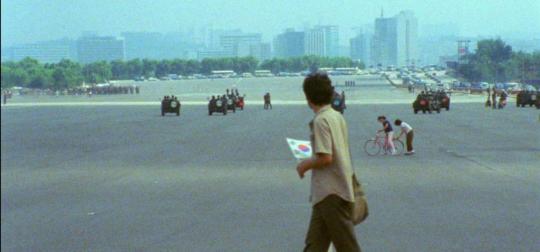
Kim Tae-Yeong
- Mr. Kant's Presentation
1987
#Kim Tae Yeong#김태영#Kim Taeyeong#Gwangju Uprising#Gwangju incident#Gwangju massacre#korean film#칸트씨의 발표회#칸트씨의발표회
43 notes
·
View notes
Text
A Reminder That We Are Human: ‘Human Acts’ by Han Kang Review
by Isobelle Cruz [May 21, 2023]
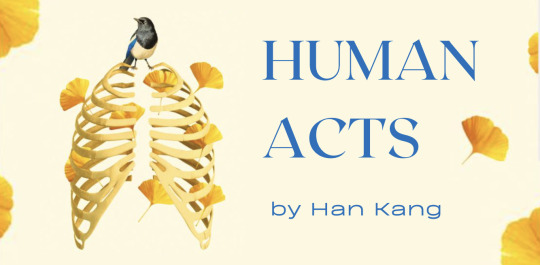
I’ve been hesitant to open up my laptop lately, afraid that I had lost it in me to write a really good article, not in terms of how many likes I receive, but on how much I enjoy the process of making it. My recent works, I admit, have felt passionless and forced for the sake of keeping my blog alive. But this is different. I devoured “Human Acts” by Han Kang over the course of one weekend—my eyes rarely drifting from its pages.
I’d never encountered an interest in the author’s works before, but once I stepped foot in the bookstore, I was suddenly drawn to its cover; simple and clean, silencing the world that surrounded me into muffled echoes.

“Gwangju Uprising” scene in Saedeuldo Sesangeul Teuneunguna at the Yeongwoo Theatre, 1988 [Image Source: Yeongwoo Mudae]
Her lips move, but no sound comes out. Yet Eun-sook knows exactly what she is saying. She recognizes the lines from the manuscript, where Mr. Seo had written them in with a pen. The manuscripts she’s typed up herself, and proofread three times.
Page 101 of Human Acts
The book features the perspectives of seven characters, one of them being an editor in 1985. Eun-sook’s chapter shows her struggle against censorship and how the company overcomes this, still able to deliver the crossed-out lines of the censors through chilling imagery. Han Kang’s writing is delivered almost in the same feels as the play tackled in her book; quiet, slow, but enough to tell the story.
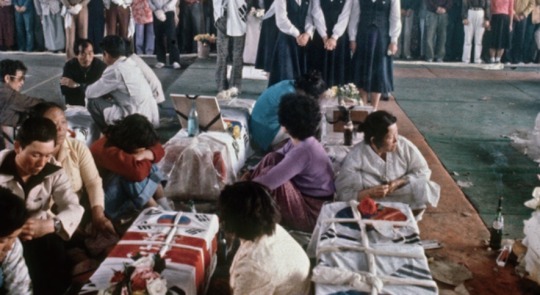
Gym turned mortuary in May 1980. [Image Source: Robin Moyer, Korea JoongAng Daily]
Another perspective that drew my attention closer than the others was of The Boy’s Friend, Jeong-dae. The words of the dead were briefly featured in the book; faceless spirits hovering over their bodies and watching as others live on, unable to do anything but watch.
If I could escape the sight of our bodies, that festering flesh now fused into a single mass, like rotting carcass of some many-legged monster. If I could sleep, truly sleep, not this flickering haze of wakefulness. If I could plunge headlong down to the floor of my pitch-dark consciousness.
Page 56 of “Human Acts”
It was depressing, and made me conscious of the body I still have control over—a blessing that I often take for granted.
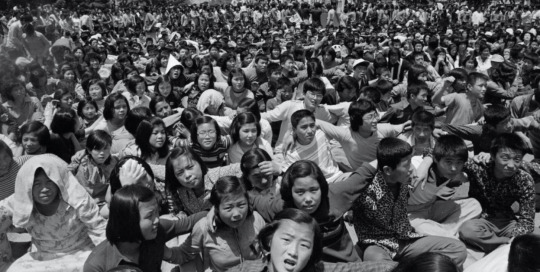
Students on the streets of Gwangju, 1980 [Image Source: Lee Chang-seong, May 18 Memorial Foundation]
Is it possible to bear witness to the fact that of a foot-long wooden ruler being repeatedly thrust into my vagina, all the way to the back wall of my uterus? To a rifle butt bludgeoning my cervix? To the fact that, when the bleeding wouldn’t stop and I had gone into shock, they had to take me to the hospital for a blood transfusion?
Page 164 of Human Acts
Human Acts is flinchingly explicit and gory. It tells the stories of victims from different angles, some of which I would forget to consider if I had not opened this book.
It disturbs me to display these photos on here, but I believe that if words are not enough to deliver chills to the blinded eyes of people, photographs will.
The kids in the photo aren’t lying side by side because their corpses were lined up like that after they were killed. It’s because they were walking in a line.
Page 133 of Human Acts
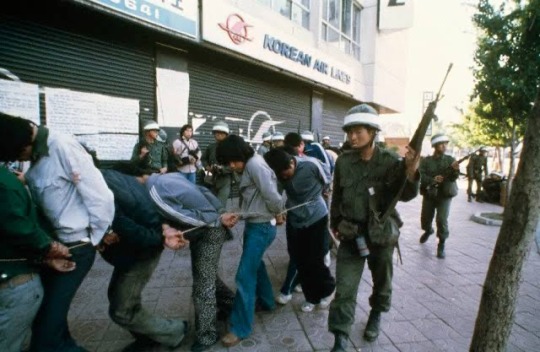
Whether you read this in the rain, or at the beach where life is supposed to be happy, a strike of pain will stay in the back of your chest, the images of agony haunting you even in bed.
Human Acts truly opened my mind much more than the other books I’ve read that spit out facts and statistics, so much so, that I am driven away from what matters most—feeling and sympathizing with the victims. Most books I’ve encountered focus solely on hating the dictator that I finish them feeling sort of empty, that I am the same person as I was when I started the book. But that is not the case with Han Kang’s third novel. It reminded me that I am human, and how much my life should be valued.
#han kang#human acts#south korean literature#korean history#asian literature#asian author#asian history#martial law#chun doo hwan#gwangju massacre#gwangju uprising#May 18
8 notes
·
View notes
Text
its funny how gringos criticize china for the tiannamen square massacre but never talk about the kent state massacre or the gwangju massacre or any of the other non violent protests around the world crushed and censored by police, military, and governments
#talk#and this isnt to downplay the horror of the event#just showing how hypocritical it is to only criticize the Us's enemy when theyre just as guilty of this
151 notes
·
View notes
Text
what i read in apr. 2023:
(previous editions) bold = favourite
class, race, & labour
the deputy and the disappeared (usa)
the dystopian underworld of south africa’s illegal gold mines
inside australia’s university wage theft machine
lydia maria child and the vexed role of the woman abolitionist (usa)
gender, sexuality, & intersectionality
the narcissist’s playbook
blurred lines, harbinger of doom
how revenge porn is used to silence dissidents in azerbaijan
queer villains are vital to understanding queer history
politics & current affairs
adrift
the rose-coloured tint on shou zi chew overlooks tiktok’s red flags
“we shouldn’t grow up dreaming that our friends don’t get killed”
how to wash your hands in a war zone (colombia)
why south koreans want the bomb
history, culture, & media
former south korea president’s grandson apologises to victims of gwangju massacre
singapore’s prison without walls made the world sit up in 1960s. how did it fall apart?
honey, i sold the kids
dril is everyone. more specifically, he’s a guy named paul
sudan
keep eyes on sudan (guide/resources)
sudan’s outsider
a plague o’ both your houses: the false dilemma of sudan’s elites
sudan’s coup has shattered the hopes of its 2019 revolution (2021 coup)
187 notes
·
View notes
Text
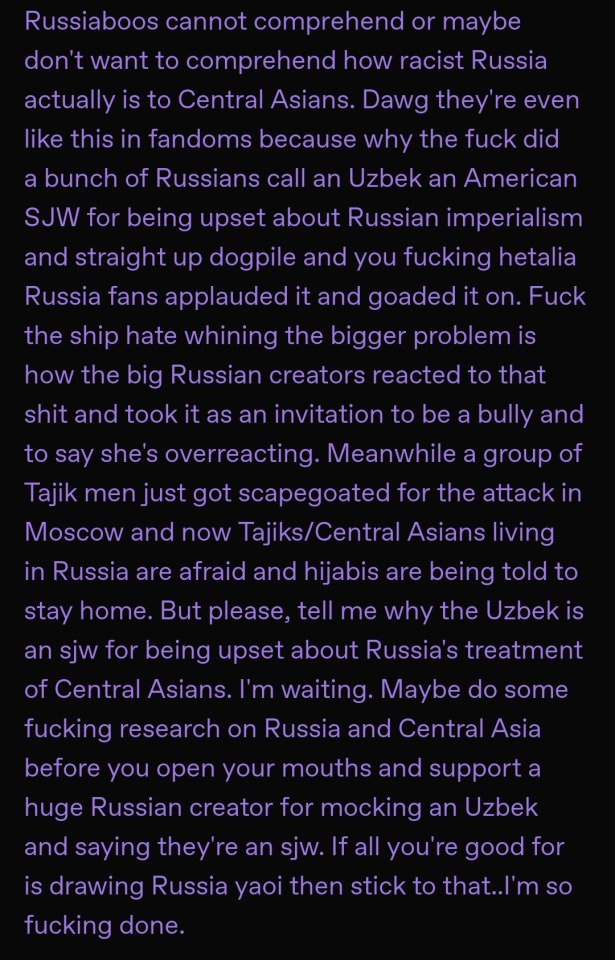
I've been considering making this post for a while but hesitated since I don't wanna beat a dead horse.
I'd like you to look at this post looking back at the Andijan massacre. What started as people protesting issues like distribution of gas, electricity, and other human needs and rights ended in a bloodbath. A cousin of mine told me schools taught it as "the national guard protecting civilians from Islamist terrorists."
I'd also like you to look at this paper by the Human Rights Watch on the torture and persecution of Uzbek Muslims like me during Islam Karimov's 20 years of dictatorial rule. Even Uzbek Muslims outside of Uzbekistan weren't safe. Multiple family friends of mine were randomly tackled to the ground and arrested by Korean Police on accounts of "domestic terrorism" in Uzbekistan, and some were only released about 5 years ago.
You weren't allowed to wear hijabs(even in Islamic universities), openly pray, read the Quran, or do anything religious. Someone would always be there watching to report you.
I wasn't allowed to go outside by myself around my neighborhood due to Uzbek government agents kidnapping the children of Uzbek diaspora abroad. I wasn't allowed to wear a hijab until after we went to Uzbekistan 2 years after Karimov's regime ended, and we made sure it was safe there and back. I wasn't even allowed to visit the country to see my relatives for almost a decade because of the crackdown on Uzbek Muslims.
When Uzbekistan was colonized by Russia as the Uzbek SSR and even before then as Turkestan, Russia made sure to stamp out religion entirely. They killed off scholars and poets like Cholpon, who wrote about Uzbek self-determination and praised religious texts. Uzbekistan's first leadership since its independence carried on with this policy, with Russian colonial values ingrained into them.
As for Korea, our partition was opposed by the whole peninsula. When Jejuans protested the US-UN backed elections, it ended in 10% of Jeju's population being killed by joint US-Korean forces. Though the South Korean Government apologized for the first time recently, the US stays silent. What a surprise. The bodies of these Jejuans were buried in mass pits and had the Jeju Airport built on top of it.
The US still fails to apologize for the No Gun Ri Massacre, in which the US Army murdered about 300 Korean villagers despite knowing they were civilians and therefore not targets. The US also indiscriminately bombed North Korea with more bombs than they had in the Pacific Theater in World War 2, martyring almost 2 million Koreans.

After the Korean War followed almost 30 years of dictatorship by Syngman Rhee, then a military junta, then Park Chung Hee and Chun Doo Hwan. During this time, university students protesting the dictatorial rule established by the US were arrested as "anti communists," and be tortured repeatedly, sometimes even until death.
Though the Seodaemun Prison is known for being Japan's colonial prison where they arrested independence activists, the Korean dictatorships used it to arrest people in favor of democracy.
The Namyeong-Dong Anti-Communist Investigation Office was a similar prison, in which one of the floors had extremely thin, narrow windows to avoid prisoners from escaping. Park Jong Cheol, a Seoul National University student who was protesting against Korea's military dictatorship at the time, was incarcerated here and routinely tortured. He eventually died due to water torture.
The Gwangju Massacre was a protest held by many activists against Chun Doo Hwan's dictatorial rule, which came about as he staged a coup and successfully overthrew the previous government. As they called for democracy, Chun Doo Hwan brought the national army, who fired upon, killed, and raped the protesters. Chun Doo Hwan was never held responsible for his crimes before he died, and his grandson recently apologized to the victims and their loved ones. It was found that the US approved Chun Doo Hwan's plans to use armed forces on the protesters in Gwangju.
Though the Gwangju Massacre is taught about in Korea, much of the US involvement and responsibility of the horrors of the dictatorship is left out.
The US does not allow Korea to produce its own nuclear arsenal, allowing Korea to rely entirely on the US for nuclear support. Additionally, the existing presence of the USFK in Korea and their joint training sessions with the ROK army further provokes North Korea and therefore gives the US a "justification" to maintain its military presence in Korea.
Growing up I was taught where to look for nearby nuclear shelters. We visited the War Memorial of Korea multiple times, and air raid sirens are rare but are happening more often recently.
This, along with the added danger of living as Uzbek diaspora outside of Uzbekistan as Muslims.
So when I say "please respectfully depict Russia and the US when it comes to the Cold War in a way that does not center them entirely" and "please keep the gravity of their actions in mind as you write them; Hetalia does not exist in an apolitical vacuum,"
and I am met with "mature adults" telling me that "they're just characters," or
"i'm the one ruining the fandom," or
"block and move on," or
"i love russia and america cold war!!!" or
"you're crazy" or
"moralf*g" or
"someone's sensitive"
and especially from russian artists who call me an "American SJW." russians calling me an uzbek overly sensitive for asking that they portray their country a little more respectfully to the victims of their colonialism. yeah that's completely normal
you are normalizing centering discussions about the Cold War to the imperial core, and then having nothing of substance to say about and being absolutely insensitive towards someone who's life has been and still are dictated by these imperial forces, and even harrassing them.
where's the "block and move on" mentality you prided yourselves for?
this fandom hasn't changed since the 2010s. it's just more quiet in the way it marginalizes victims of colonialism.
oh, and that person who told me to "block and move on, sister!!!" when it comes to me explaining myself as an uzbek-korean muslim?
you're not one to talk. 네가 뭘아는데 ㅅㅂ새끼야
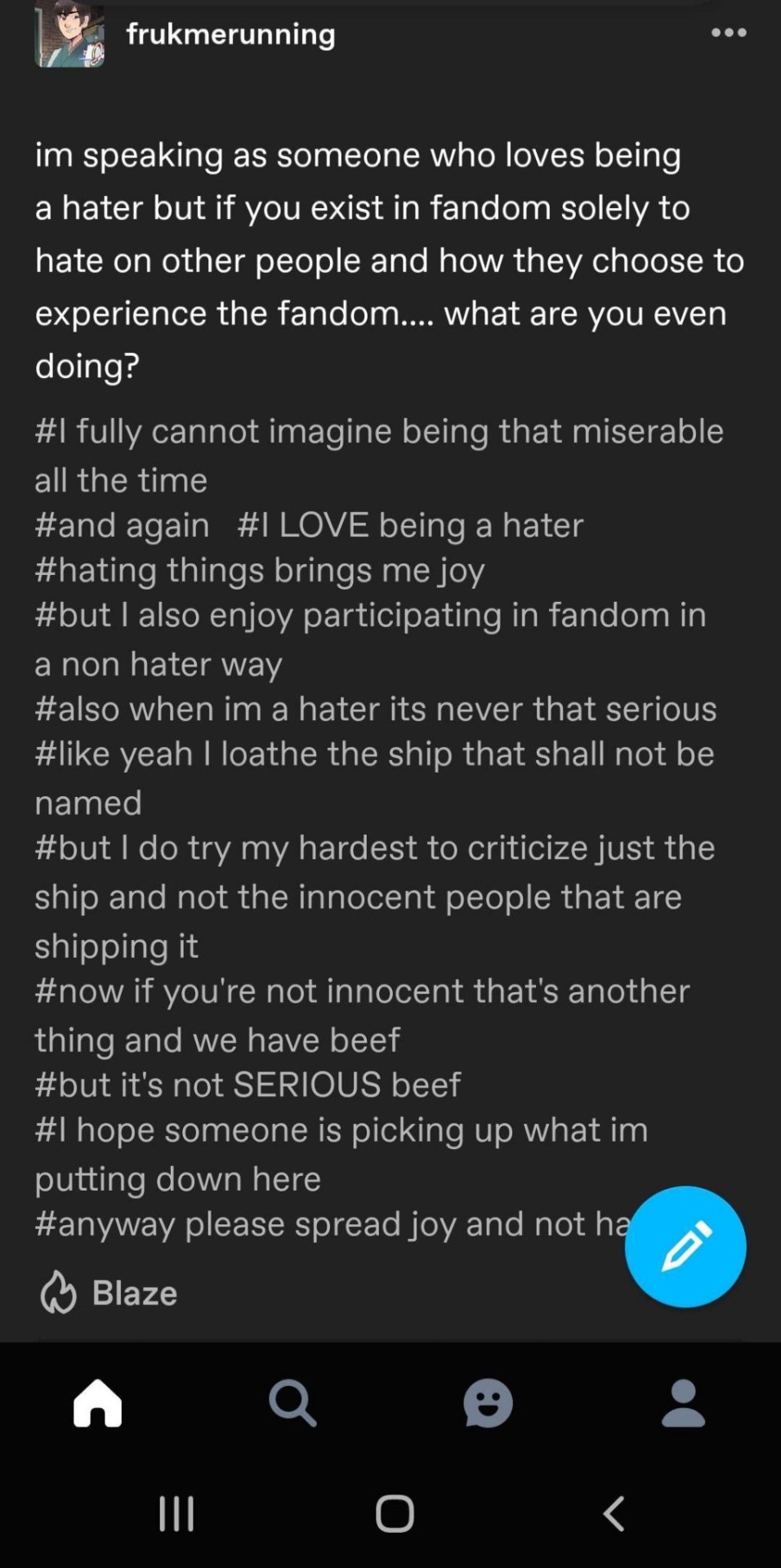
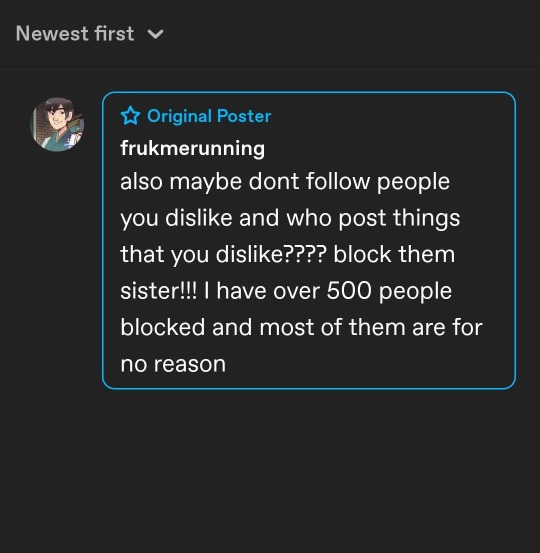
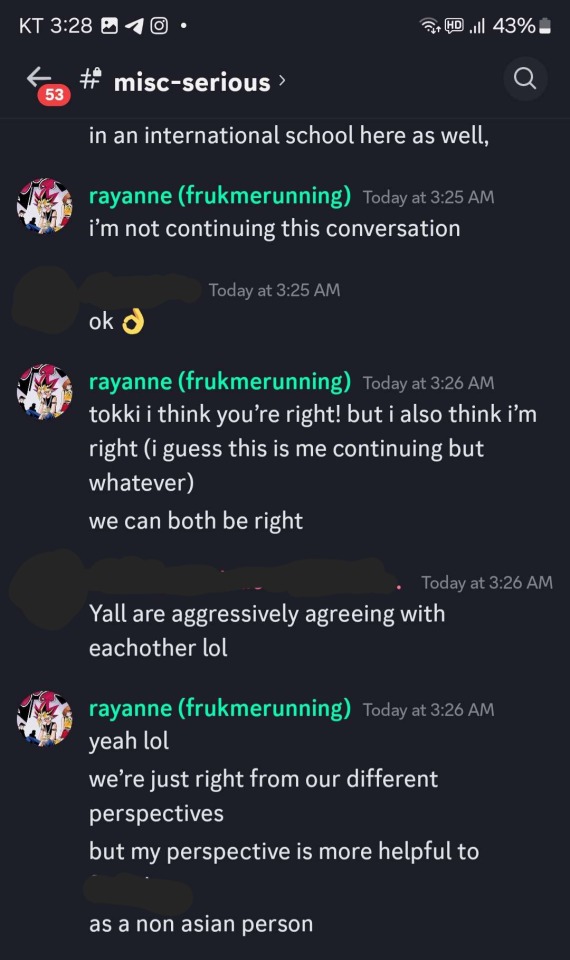


#hetalia fandom#vent#disk horse#i cant wait to have a barrage of insults thrown at me again ♥️#you need to go get your brain chemistry checked i think#hetalia#for those of you who comforted me during this time thank you all so so much#my mental health severely declined that week#i'm so grateful to have you as friends
39 notes
·
View notes
Text
Korean War and Related Reading Recs!
I recently reblogged a post and shared some books I know that have North Korea/DPRK as a topic. Here's a more complete list of books I have on Korean War history and related tangents. I haven't read all of these, and most I haven't read in maybe 3 years so I'm a little fuzzy. All are worth checking out though I think.
Korea: Division, Reunification, and U.S. Foreign Policy by Martin Hart-Landsberg - Far from perfect but in my opinion this is one of the best crash-course books that covers a bit of prewar Korea, US involvement, and discusses Korea's position amongst other Cold War conflicts.
Patriots, Traitors, and Empires by Stephen Gowans - This one is similar to the one above but has more emphasis on events and people North Korea, and is a bit more focused on the peninsula than global implications.
The Hidden History of the Korean War by I.F. Stone - Major major major book in Korean war studies, originally published in 1952 while the war was ongoing. So certain events and questions are highlighted and discussed that got more washed away by popular history.
A Korean American Housewife Goes to North Korea by Shin Eun-mi - A collection of travel diaries from her travels to North Korea between 2011-2012. I'm not sure how the English translation is but I read most of it in Korean. As far as I could tell she's a little naive about the history and understanding of the tensions between North and South, but it contains tons of photos and musing about reunification. There's a documentary on the aftermath of this book being published called To Kill Alice
Works by Bruce Cummings - Cummings is probably the most major English language historian of Korea. I have never completed any of his books because he tends to make weird racist comments typical of an old white American, but he has compiled a TON of sources and information in his books and his bibliographies are good to sort through. Especially in the two volume The Origins of the Korean War, though the second volume is pretty impossible to get a hold of outside a major university.
Gwangju Diary by Lee Jae-eui - (Haven't read) A day to day eye witness account of the Gwangju Uprising.
The Massacres at Mt. Halla by Hun Joon Kim - (haven't read) On the Jeju Uprising/Massacre in 1948 and subsequent conflict and politics on and around the island
Haunting the Korean Diaspora by Grace M. Cho - (haven't read) On the emotional and physical violence between the US and Korea with a focus on sexual relationships between South Korean women and US soldiers.
Korea's Grievous War by Su-kyoung Hwang - (Haven't read) Looks like a focus on Korean politics and internal conflicts between 1948 and 1953
Ideologies of Forgetting: Rape in the Vietnam War by Gina Marie Weaver - This one is on Vietnam but there are sections that discuss Korea and South Korean soldiers in Vietnam. I think it's an amazing book on US war ideology and sexism within the US military that can go hand in hand with any book on US wars
Feel free to add on if anyone has any more recs! I know there's a lot more out there
7 notes
·
View notes
Note
I saw your post about angst earlier and I thought "atydsp was the *angstiest* most miserable book I've ever read" (it's a compliment btw) and then I remembered that YOU wrote it. So, you being an angst lover and the writer of the angstiest thing I've read, I wanted to ask you for recs(?), If that's ok(?)
Just, what are the angstiest books/fics you've ever read? Like, stare-at-the-wall-and-cry-silently-for-hours, feel-numb-for-days, make-you-want-to-scream-like-your-first-born-died, kind of angst. And, if you want, even throw in there films, music, poems too,idk.
It's all about the feeling. I just want to get my soul ripped apart and bleed-out on the floor again:'(
If it's too much or if it's weird, I'm sorry and feel free to ignore me pls<3
look at me. look into my eyes. you are my favorite person on this website right now. i LOVE this question omg ok buckle up i'm making a list
rae's angstiest-of-all-time recs*:
*with the caveat that this is a subjective list, these are just things that made me, specifically, feel like crying and screaming and staring at the wall for whatever reason. not all of these are stories that end in tragedy; some have happy endings! but if it made me feel like my guts were being twirled around like spaghetti on a fork at some point then it made the list <3
fics:
hackery, by orphan_account i will keep yelling at people to read this until the day i die it is SO good and literally under 2k words u can finish it in like five minutes. go read it rn PLEASE i'm begging
a great, big tragedy by zeppazariel @mayzarbewithyou for all crimson rivers angst enjoyers <3 the au what-if-regulus-died ending
let the ghosts sleep tonight by outlaw_baby dorlene oneshot set during the first war SO beautiful i reread this all the time
zwischen immer und nie (between always and never) by sudowoodo an albus dumbledore/gellert grindelwald fic about the summer they fell in love. was recommended to me by a friend who knows i love angst and thought i would appreciate it. they were correct.
notes on a resurrection by newleaves perhaps my favorite fic of all time and one that was also recommended to me by a friend! this one has a happy ending but BOY does it take you on a ride to get there
that's the art of getting by by sarewolf @sarewolf one of my favorite fics ever <3 another happy ending but plenty of angst before we get there <3
choices by messermoon @little-shit-soph i mean i feel like i don't even need to say anything about this one but. yeah if ur looking for tragedy and angst this is a good place to go lmao
books
the feverwake duology, by victoria lee i don't think i've talked about this series before on my blog but it is one of my FAVORITES of all time oh god. it's so so so fucking good dystopian sci-fi magic plague war just. SUCH a cool concept and SUCH beautiful writing i've read it three times and might need to reread soon lol
teeth, by hannah moskowitz gay mermaid love story but like. in the absolute most fucked-up way possible. i love this book SO much hannah moskowitz is just one of my favorite writers of all time
a history of glitter and blood, by hannah moskowitz my favorite book! another story where you get a happy ending but the angst u go through to get there...exquisite
human acts, by han kang made me cry like a fucking baby. this is historical fiction based on very real events and interviews with people who experienced the gwangju uprising + massacre in south korea in 1980.
the song of achilles, by madeline miller another one that i feel like i don't even need to say anything about lol
crush, by richard siken poetry!! here's ur poetry rec. the richard siken hype is not a lie this book will gut you
the animorphs series, by k.a. applegate i am being 100% serious this is one of my favorite series of all time and i read it for the first time as an adult like. this is not childhood nostalgia it was too scary for me as a kid. genuinely changed the way i think about writing and truly is one of the best war stories i have ever read. the last book is gut-wrenching in a way that very little else i have come across is.
the hunchback of notre-dame, by victor hugo for the classics enjoyers <3 victor hugo is one of my favorite writers i was really into his books in high school lol
the man who laughs, by victor hugo not as well-known as his other work but i wrote a big research paper on this book one time so it holds a special place in my heart just bc i spent so much time with it
tv shows
banana fish (2018) outing myself as an occasional anime enjoyer lmao. i watched this bc i kept seeing people talk about how tragic it was and then i saw my sister watching it and i looked up a plot summary of what happens at the end and i was like huh that sounds interesting. and then i sat down to watch it KNOWING what was going to happen and i still like. was screaming crying by the end.
the haunting of bly manor (2020) just re-watched this show like two months ago and it is 2/2 on making me cry so!!
movies
children who chase lost voices (2011) this movie has a happy ending but like. idk man there's this one specific scene that just GETS me every time. always feel hollowed out but like...in a good way after watching it.
brokeback mountain (2005) i mean...do i need to say anything about this one? gay cowboy tragedy my beloved <3
the last unicorn (1982) watching this movie as a kid is i think what altered my brain chemicals and made me an angst enjoyer. so! had to put it on the list <3
and of course on a final note--as these are heavy angst + tragedy etc etc if u know there are things u need to watch out for please look up trigger warnings before diving in! they all contain content that is upsetting in some way...hence the angst. hopefully that doesn't even need to be said but. well an honest hard-working angst farmer needs to cover his bases sometimes doesn't he
also! tysm for the angst praise lol SO happy to hear that atydsp is one of the angstiest things you've read truly the highest form of praise 2 me <3
69 notes
·
View notes
Text
meet me where the flowers are — h.hj
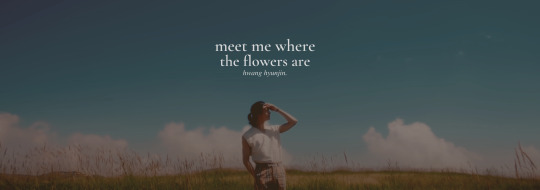
excerpt. “ano daw la kun aadi la gihap? iba gud it kabutangan hiton akon kinabuhi.” (what if you were still here? things would’ve turned out differently.) — hain ka, bullet dumas
pairings. hwang hyunjin x gn!reader
genre. hurt/comfort, angst
warnings. implied character death, mentions of death, references to the gwangju massacre of 1980.
word counts. 1.7k
notes. for those who have suffered in the hands of the cruel who took advantage of their power over others, we have not forgotten. | my entry for the 24/8 collab, inspired by the drama youth of may.

There is nothing but silence long after the call ends, deafeningly loud in the quiet of your office. And it’s suffocating.
Time slows and stretches, keeping you caged in the fraction of a moment during the call. The line was long dead, reduced to a monotonous beeping against your ear. The news didn’t shock you as much as you thought it would, less a source of peace of mind than a reminder of a weight once carried and now long forgotten. It wakes a dormant side of you, one you didn’t expect to remain asleep for so long, the part of you still tethered to your roots—to your hometown, Gwangju.
You’re out of your office the second it sinks, not necessarily in a rush but with a sense of urgency that won’t let you wait a day longer. You take the first train down seated by a window, watching time rewind outside the glass. The further you got, the lower the buildings and the further they were apart. Here, the fields stretched as far as the eye could see, cut by only train rails and uncemented paths winding through the greenery. The ride was long but it passed in a blink, sceneries growing more familiar the closer you got to the small town.
It’s 3pm when you arrive at Gwangju and as if the whole town was encapsulated in a globe, shielded from the clutches of time, nothing much has changed. Springs in Gwangju are warmer than the ones in Seoul, the telltales of the upcoming summer already evident in the heat waves painting mirages on the streets. The town lacked the thick humidity of the city, its air free of grey smoke. There was no overcast sky, no smog looming overhead. Just a bright blue stretch with white wisps of clouds scattered and carried by the wind.
The view appears like a portrait mounted on the wall, the painting’s movement limited to the frames of the window pane. Its hues were vibrant against the dull browns of the room, your eyes naturally drawn to what was out there. The fields could be seen from here, green expanse topped with the warm yellow canola flowers that bloomed in May.
“_____?”
The hinges creak as the door swings open, the wooden floorboards groaning as the man crosses the room. His voice is unmistakable. It’s the same one that had been on the phone with you hours before, the bearer of the news you both dreaded and waited for these past few decades.
The pain had numbed down long ago, memories long buried beneath newer ones. But the heart was a muscle and it remembers the way the rest of its system did. Mid-afternoons were once unplanned escapades to the canola fields and races down the in-betweens until your lungs couldn’t keep up. Other times they were hushed conversations in quiet libraries and playful nudges beneath wooden tables. Their focal point remained the same, the tall boy with a camera perpetually hanging over his neck like a necklace. The afternoons were the first to lose their meaning, your life switching back into your old routine after his disappearance.
It was spring you’ve come to dread, having known him for the brief time of the year when the flowers were in full bloom. Spring passed and summer too, then the temperature cooled in fall until the inevitable frost of the winter made you wish time stopped there. And he’s forgettable throughout the other months, his memory tied to bright skies and open air, barely present in the rest of the year. But spring comes annually and for those months, reminders of him were scattered everywhere; in the flowers of the field, in the coolness of the breeze, in the warmth of the sun, and in the quiet of the afternoon. The vibrant season had long lost its color, forever tied to the ellipsis that haunted you for years—what if he made it back that day, would things turn out differently?
They found him today, alongside a few others in an excavation operation, nothing but sets of bones buried beneath rows of flower fields. Gwangju, determined to honor the memory of its own people, never stopped the search for its victims even now, decades after the event that smeared the small town’s history forever.
“We found these buried along with him,” the man says, setting down ziplock bags on the table before you. “We've examined a few of the rolls and found photographs we could print and hang in the exhibit. But there is a roll we think you’d want to see.”
The Gwangju museum sat at the heart of the city. It was a bitter testament to a period of the town’s history repeatedly buried, preserving the memory of those who were never found nor searched for on its cream walls. Fragments of the past were caged in glass cubes, a commemoration for the brave souls who stood their ground against injustice even at the expense of their own lives. The museum stood as evidence of the downplayed catastrophe, those whose deaths were swept under the rug—buried along with those who were supposed to remember them. Missing posters covered the wall in a mosaic of names and faces. A few lived to tell the tale while others died fighting for what they believed in. Some of them found, others still missing.
Hwang Hyunjin’s disappearance was pivotal to the rebellion, the realization that the government was no longer trying to sniff out spies but trying to cover up the military’s abuse of power. You warned him long before that, but your pleas fell on deaf ears, his drive for freedom stronger than his need for safety. So he carried on, documenting both pieces of his life and fragments of history in the blinks of his camera. When you looked back on that afternoon, you remember the searing heat of the sun that was hotter than most days, the long wait for something that would never come. That day, he flew too close to it.
The projector flickered on the wall, pixelated figures appearing within the frame. There are spaces in between, images lost in time, but most of them remained. A warmth spreads across your cheeks, the sight of you from a younger time preserved in the shots that he’d taken. There’s a bluish tint to it but it still carried the warmth of those afternoons in the sun, the photos taken in chronological order in the months you spent together. You were the sole subject of every picture, the field of flowers fairing in comparison to the camera’s focus. You are there; under the shade of the tree on the hill you used to climb, across the table at the university library with your head bowed, looking out the window of his room wrapped in nothing but his sheets. You, in the eyes of Hwang Hyunjin.
Then finally, a photo centered around two figures, the cream walls in the photo blending into the room’s walls well enough it seemed that its subjects popped out of the image.
“We wanted to verify if the person in the photo is you?” the man asks, as if he hadn’t come to the conclusion long before but you give him a nod anyway. “And the guy beside you is Hwang Hyunjin?”
Even after all those years, your heart stutters at the mention of his name. You haven’t heard it in so long but it retained its familiarity, like the tides of time has left it untouched at the back pockets of your heart. In the photo, you sat next to one another, his arm lazily draped over the back of your seat. He smiled at the camera while you stared wide-eyed, regretting that you hadn’t smiled for the moment. But there were a lot of regrets whenever it came to him. A lot of time you wished you spent, countless letters you wished you kept, photos you wished you took, and the list goes on. Time wore down the memory of him, his face but a blur in your mind and his voice but an echo. But he is in the image beside you, definitive proof that he hadn’t been a figment of your imagination, that he existed beyond the entries of your journals from 40 years ago.
The image flickers another time, the projector showing the final shot of the reel. This time, it is only Hyunjin with his head tilted and propped up by his arm. You remember taking it, the tremble of your fingers as you pressed down on the shutter. It captures the moment after he laughs at you, when he smiles after pointing out he could see you shaking from across the table. Turns out, the image didn’t end up shaky. You waited four decades to know that.
The man takes your silence as an answer before he continues. “We’d like to exhibit this photo of him. The rest of his reels never captured him and the only other photo we had of him was the one on his missing person’s poster. Is that alright with you?”
You shake your head. “I don’t see any problem with that.”
“Would you like to keep a copy of these photos?” He checks the time on his watch, “If you’re heading back today, we’ll get it done as soon as we can.”
You reassure him that you have no qualms against waiting a little longer. He tells you that you were lucky enough. That had the military rummaged through Hyunjin’s things longer, you wouldn’t have been alive today. A simple circumstance, luck undisputed. But you weren’t thinking of that then, dying by his side being better than dealing with the grief and not knowing what had happened to him. You know now, and maybe you have known all along, but it was the discovery of his body that brings you peace—the quiet of a long drawn out disturbance in the back of your mind finally silenced. The long line of ellipses, spanning page after page for the past four decades, finally coming into an end today.
Across the table, Hyunjin looks like he’s looking straight at you. As if he was proud of where you’ve gotten now and he heard every whisper you muttered to him on nights you missed him most. If he was here, he would’ve marvelled at it, basking in the freedom he fought for endlessly. But he wasn’t. For now, he’s but a still image on the wall—disappearing as the projector was disconnected. A fragment of you once lost and only now found; a love long treasured and now let go.

© neo-shitty, 2022
#districtninewriters#ficscafe#hyunjin angst#skz angst#hyunjin smut#skz smut#stray kids angst#skz scenarios#hyunjin drabbles#skz fluff#hyunjin fluff#hyunjin x reader#hyunjin imagines#skz imagines#HAHA#lets see if this crosstagging works#toff.writes
227 notes
·
View notes
Text
朝鮮の植民地と、属国の歴史 【朝鮮半島の統治国の歴史】
朝鮮の植民地と、属国の歴史 【朝鮮半島の統治国の歴史】 紀元前108年~220年:漢(植民地) 221年~245年:魏(植民地) 108年~313年:晋(植民地) 314年~676年:晋宋梁陳隋唐(属国) 690年~900年:渤海(属国) 1126年~1234年:金(属国) 1259年~1356年:モンゴル(属国) 1392年~1637年:明(属国) 1637年~1897年:清(属国) 1897年:下関条約により清の属国から開放される 1903年:ロシア朝鮮半島を南下。日本の尽力によりロシアの属国化を回避 1905年~1910年:日本(保護国) 1909年:早期併合に慎重であった伊藤博文内閣総理大臣が安 重根(アン・ジュングン)に暗殺される 1910年~1945年:日本(併合) 1945年~1948年:アメリカ(非独立) 1948年:大韓民国成立(アメリカ軍による朝鮮統治によって国家基盤が形成され成立) 1948年:軍事独裁政権誕生 1948年:済州島4.3事件 3万人虐殺 1950年:朝鮮戦争 400万人殺し合い 1950年:保導連盟事件 30万人虐殺 1951年:国民防衛軍事件 10万人虐殺 1951年:居昌事件 8500人虐殺 1979年:軍出身の大統領政権誕生 1980年:光州事件 600人虐殺 1993年:初の文民政権誕生 History of the colonies in Korea, and the history of the vassal states [History of the ruling countries of the Korean Peninsula]. 108 - 220 B.C.: Han Dynasty (colony) 221 - 245: Wei (colony) 108-313 B.C.: Jin (colony) 314-676: Jin Song Liang Chen Sui Tang (vassal state) 690-900: Balhae (vassal state) 1126-1234: Jin (vassal state) 1259-1356: Mongolia (vassal state) 1392-1637: Ming (vassal state) 1637-1897: Qing dynasty (belonged to China) 1897: Liberated from the Qing by the Treaty of Shimonoseki 1903: Russia moves south across the Korean peninsula. Avoids becoming a vassal state of Russia through the efforts of Japan 1905-1910: Japan (protectorate) 1909: Prime Minister Hirobumi Ito, who was cautious about early annexation, is assassinated by Jung-geun Ahn. 1910-1945: Japan (annexed) 1945-1948: U.S. (non-independent) 1948: Establishment of the Republic of Korea (the foundation of the nation is laid by the U.S. military rule of Korea) 1948: Military dictatorship established 1948: Jeju Island 4.3 Incident: Massacre of 30,000 people 1950: Korean War: 4 million people killed 1950: Hodo Incident: 300,000 people massacred 1951: National Defense Force Incident: 100,000 people massacred 1951: Geochang Incident, massacre of 8,500 people 1979: Birth of military-born presidential administration 1980: Gwangju Incident: Massacre of 600 people 1993: First civilian government 한국의 식민지 역사와 속국의 역사[한반도 지배국의 역사]. 기원전 108 - 220년: 한나라(식민지) 221 - 245: 위(식민지) 기원전 108-313년: 진(식민지) 314-676: Jin Song Liang Chen Sui Tang(속국) 690-900: 발해(속국) 1126-1234: 진(가신국) 1259-1356: 몽골(속국) 1392-1637: 명나라(속국) 1637-1897: 청나라(중국에 속함) 1897년: 시모노세키 조약으로 청나라로부터 해방 1903년: 러시아가 한반도를 가로질러 남쪽으로 이동합니다. 일본의 노력으로 러시아의 속국이 되는 것을 피함 1905-1910: 일본(보호국) 1909년: 조기 합병을 경계했던 총리 이토 히로부미가 안중근에 의해 암살됨. 1910-1945: 일본(병합) 1945-1948: 미국(비독립) 1948년 대한민국 건국(미군정으로 건국의 기틀 마련) 1948년: 군사 독재 정권 수립 1948년: 제주도 4.3사변: 3만 명 학살 1950: 한국 전쟁: 400만 명 사망 1950년 호도사변 30만명 학살 1951년: 국방군 사변: 10만 명 학살 1951년 거창사변, 8,500명 학살 1979년: 군부 태생의 대통령 행정부 탄생 1980년: 광주사변: 600명 학살 1993: 최초의 민간 정부
78 notes
·
View notes
Text
ok joining the club... February reading report! I'm mostly just mouthing off... Read at your own risk!
Dune by Frank Herbert
The Friend by Sigrid Nunez
Look, I'm a sucker for a classic. I'd been vaguely meaning to read this since I saw the Timmy Chalemet movie...and I generally have a tolerance for fairly long scifi/fantasy. I enjoyed the first maybe third of this book...and then I got bored (needless to say I will not be reading the next four Dune books although I did finish). Don't get me wrong -- I'm glad I read it. In many ways, Dune still culturally relevant, both within the world of genre fiction, and (especially because of the new film) in debates about orientalism, the Cold War, humanity, etc, etc. I found Herbert's explorations on this future version of Islam and future version of Arabic pretty interesting, but by the end of the book, I was really annoyed by the main character. There's a lot of really interesting discussion and criticism around this book, so I'm glad to be able to understand a little more of those conversations as well. Also, now I retrospectively sort of know what was happening in the movie!
I was too young to read this book. It was good; it was not for me. Revisit in thirty-five years.
Utopia Avenue by David Mitchell
Lincoln In The Bardo by George Saunders
Why did I read this? I've never read any other David Mitchell. This book was an exercise in 1960s musical fantasy, where nothing goes wrong and the truest joy is from celebrity encounters, powered by the author's love for the era, rather than having anything to say. This was a book about a rock band going straight to the top, without any real interrogation into the cultural forces and pitfalls of the 1960s, weak characterization, random tie-ins with his larger universe, and next to no tension. I'll probably still read Cloud Atlas at some point, but this one is a hard pass.
This was one of my old roommates favorite books that I gave another go after DNFing in maybe, 2018? Again, I think this might be a book I'd like more if I were older. I thought the structure and format was well-done (I especially liked the history excerpts, of course); the story itself, I was maybe luke-warm on. I thought the prose was good (especially the dialogue) and the characters were interesting. I'm not entirely sure what's making me luke-warm on it, but I liked it enough to be glad I read it.
Human Acts by Han Kang (trans. Deborah Smith)
This was the best book I read this month, hands down. Maybe this year as well. Kang masterfully weaves together a number of stories around the Gwangju massacre of pro-democracy demonstrators. This book was at times, extremely brutal to read (and I would say I have a fairly high tolerance in text). It was clearly well-researched, well-lived, and well-considered. The topics it tackled were both grains of sand and the meaning of humanity itself. I really, really, enjoyed this book; I highly recommend it, and I definitely look forward to reading The Vegetarian in the future. Bonus reading: Han Kang and the Complexity of Translation
All The President's Men by Woodward and Bernstein
I constantly get this one mixed up with All The Kings Men by Robert Penn Warren (also good). One of my college friends had just read this and sent me a number of random updates throughout their reading, mostly focused on Woodward and Bernstein's....tense relationship. Like most Americans, I've been vaguely aware of Watergate my whole life (I even saw that movie The Post!), and I think this book really did a good job laying out the reveal of the story as well as sort of the in-house tensions that were going on. My copy (from the library) was the original 1974 edition, and I sort of wish that I had a more recent version with a little bit more distance on the events, but it's kind of fun to have been "right in there." I generally do like this style of expanded-reportage book (see Ronan Farrow's books, or in another genre, Jon Krakauer), and Watergate still looms so large in the American political imagination, so I'm glad I read this one too.
Beyond Babylon by Igiaba Scego (trans. Aaron Robertson)
This is a book I would have really liked to enjoy. I didn't. I kept saying to myself -- well, maybe it's just the translation that didn't work for me (the whole book was a bit clunky to read). There are a lot of really interesting themes in this novel (fluid identity, colonization, language, coincidence, politics, choice and nature, etc), interesting characters, play with language, a sweep of history that could have been fascinating. However, in practice, it didn't work for me. The different storylines sometimes were confusing, the plot at times eluding me, seemingly unnecessary tangents taking me nowhere. It was a slow read. There was just a lot here (and maybe it's just through my background that I was missing pieces)...and none of it quite fit together.
Murder by the Book by Claire Harman
Totally random book I picked up at the library. It's not really a topic or like...an era (the metropolitan center of Victorian Britain??) that I care about, but I was like, hey, cool cover, I want an easy read this week, etc. I thought it was well written and well researched, and I definitely learned some stuff about the literary scene of the era. It was also amusing how some of the debates around "base literature" are...pretty much the same today as they were in the 1830s.
Beasts of a Little Land by Juhea Kim
Look, you ever read a book and you can just tell it was written by a Harvard/Yale/Princeton grad? Well, this was one. This book was extremely readable. It's got decent characters who are fairly easy to get invested in and a structure that pulls you through the text, all while set across a complex, divided, and rapidly changing backdrop of early 20th-c Korea. However, the narrative itself rung flat, and the book's promised complexity disappeared before I got through the second chapter -- it's almost a completely sanitized view of two very complex worlds: that of high-class courtesans, and that of orphans/gangs who become politically involved. Narratively things go wrong, but it's almost never because the characters make bad decisions -- except perhaps in love -- which collapses the once-promising characters. Also, it jumps from 1945 to 1964 at the end...not very successfully (the opening/closing of the book was extremely trite and not terribly well-done). This book was almost disappointing because it promised more than it could deliver, falling straight into the chasm of mediocre novels by diverse graduates of elite institutions. I didn't do it any favors by reading it so soon after Human Acts either, although they're very different novels.
The Thousand Crimes of Ming by Tsu Tom Lin
The advertising around this book does it poorly (do not go in expecting anything Cormac McCarthy-like LOL). Don't get me wrong, I liked this book -- I do enjoy a modern Western and I think Lin does a great job highlighting the role of Chinese workers on the expansion of the railroad, as well as the curiosities of the era through a fantastical magic troupe. The NPR review of this book highlights how each character plays with genre, which was true and definitely one interesting part of the novel. Thematically, I thought this book was interesting if a bit restrained, and the characters were neat. Unfortunately, though I enjoyed giving this one a read, at the end of the day, it's all a bit forgettable.
Dumb Luck by Vu Trong Phung (trans. Nyuyen Nguyet Cam and Peter Zinoman)
Tumblr bookclub read! Like I said to A and Rhu, I found the introduction "Vu Trong Phung's Dumb Luck and the Nature of Vietnamese Modernism" by Peter Zinoman more interesting than the text itself, but overall, I'm glad I read the book. It's always really interesting to read these sort of big, foundational texts -- even in fairly recent translation. I haven't read a lot of satire and really don't know that much about Vietnam before American involvement, but the thrust of the text was definitely quite interesting (and brutal -- one review described all the characters as antagonists) even if I didn't fully understand all the conversations, it was taking part in.
Heart of Darkness (3rd Norton Critical Edition) by Joseph Conrad (ed. Robert Kimbrough)
Confession: I think I'd read this before and almost entirely forgotten it. I didn't particularly enjoy the book and literarily, I'm not sure that I got what quality elevates it to a "great novel." I especially enjoyed the back-and-forth among several scholars (especially around Achebe) about its relationship to colonialism, inclusion in the canon, and European self-definition against Africa as a "primitive other." I'm glad I read it mostly because I feel like it gives me a better sense of the larger conversation around Leopold in the Congo and the literary/related discourses around the scramble for Africa. So, thematically, glad I read it; literarily, whatever.
The Last King of Scotland by Giles Foden
The end :) maybe I'll do this again someday!
Another confession: I pick a lot of books by wandering around the library and just grabbing one that looked interesting. I did read Heart of Darkness before this for a reason. I quite liked reading this one -- I thought the narration was really interesting and the narrator's complicity in the brutality of Idi Amin's rule was neat. Certain scenes were very brutal (and the book was certainly well-researched). I felt like at times, the time-skips didn't quite work, but the general disconnect between Garrigan, his identity, and what was happening around him was interesting. I think I had to watch the film that was a loose adaptation of the book in class in high school. I think I could probably have some more interesting thematic and political comments on this one if I sat on it a little longer, but I'm kind of getting tired of writing this and also I finished it like, twelve and a half hours ago or something.
#Monthly book round-up#<- look a tag#On reading#I'm realizing now I didn't put my like... Number reviews... Oh well
26 notes
·
View notes
Text
5월 / May
1일 - 근로자의 날: Labor Day (also called 노동절; there are 2 different words for "worker"); this is not a red day but is a paid holiday for people who count as "workers" (the laws are very confusing and there are articles every year about who gets the day off/paid extra)
5일 - 어린이날: Children's Day; it's a red day so kids can have a day off from school and have fun
6일 - 입하: Ipha, one of the 24 seasonal divisions; this is when summer begins
8일 - 어버이날: Parents Day (not a red day, kids give flowers/gifts to parents)
15일 - 스승의 날: Teacher's Day (not a red day, students give gifts/letters to their teacher(s) but the anti-bribery laws are meant to stop people from doing too much...)
18일 - 5.18민주화운동기념일: Anniversary of the May 18 Democratization Movement (aka the Gwangju Uprising); this is another incredibly important event in the history of Korean democracy. Residents of Gwangju protested the military dictatorship of Chun Doo-Hwan (who became the 5th president), and the government's violent suppression of the protests turned it into an armed uprising. It lasted from May 18-27, 1980 and there were an estimated 600-2,300 victims. The gov. established the day of commemoration in 1997, but conservatives and right-wing groups often deny the events. (In more recent news, the grandson of Chun Doo-hwan apologized for his grandfather's actions and particularly his role in the massacre in Gwangju.)
21일 - 소만: Soman, one of the 24 seasonal divisions; this is when plants are growing and rice planting begins
27일 - 부처님 오신날 (4.8 음력): Buddha's birthday (lunar calendar 4.8), temples do special celebrations and there are lantern decorations up around neighbors
29일 - 대체공휴일: alternative holiday; Buddha's birthday is on a Saturday this year, so the following Monday is taken off as a red day instead~
17 notes
·
View notes
Text
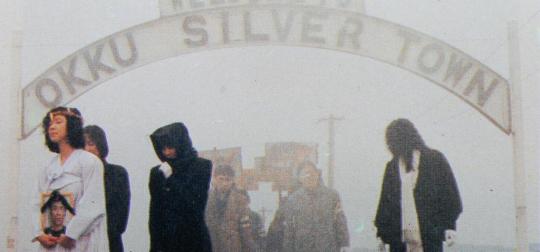
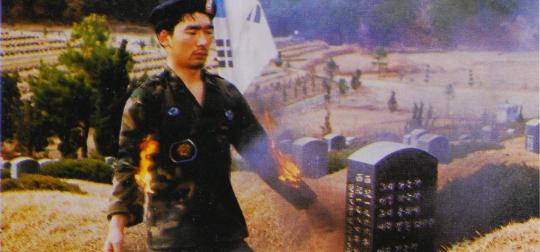
Kim Tae-Yeong
- Wilderness
1988
#Kim Tae Yeong#Wilderness#황무지#김태영#Kim Taeyeong#Gwangju Uprising#Gwangju incident#Gwangju massacre#korean film#1988#okku silver town
18 notes
·
View notes
Text
Oh Yoon
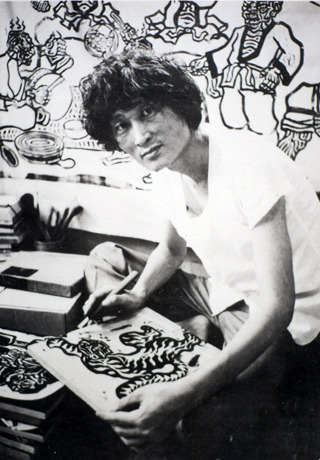
(b. 1946, d. 1986), a South Korean painter focused in modernism and contemporary art. His art largely expressed how South Koreans felt pre, post, and during the Gwangju massacre.
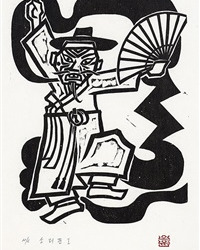
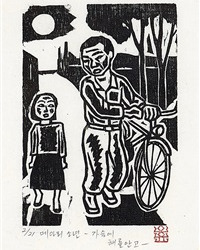
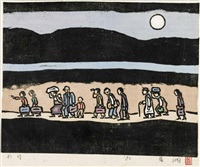



check out artnet to see more of his stunning art
#south korea#korean#korean artist#south korean art#oh yoon#artwork#painting#art#art history#modern art#modernism#peoples art#contemporary art
3 notes
·
View notes
Text
Massacre Part II - Kim Nam-ju - South Korea
Translators: Chae-Pyong Song, Melanie Steyn (Korean)
It was a day in May.
It was a day in May, 1980.
It was a night in May, 1980, in Gwangju.
At midnight I saw
the police replaced by combat police.
At midnight I saw
the combat police replaced by the army.
At midnight I saw
American civilians leaving the city.
At midnight I saw
all the vehicles blocked, trying to enter the city.
Oh, what a dismal midnight it was!
Oh, what a deliberate midnight it was!
It was a day in May.
It was a day in May, 1980.
It was a day in May, 1980, in Gwangju.
At noon I saw
a troop of soldiers armed with bayonets.
At noon I saw
a troop of soldiers like an invasion by a foreign nation.
At noon I saw
a troop of soldiers like a plunderer of people.
At noon I saw
a troop of soldiers like an incarnation of the devil.
Oh, what a terrible noon it was!
Oh, what a malicious noon it was!
It was a day in May.
It was a day in May, 1980.
It was a night in May, 1980, in Gwangju.
At midnight
the city was a heart poked like a beehive.
At midnight
the street was a blood river running like lava.
At 1 o’clock
the wind stirred the blood-stained hair of a young, murdered woman.
At midnight
the night gorged itself on a child’s eyes, popped out like bullets.
At midnight
the slaughterers kept moving along the mountain of corpses.
Oh, what a horrible midnight it was!
Oh, what a calculated midnight of slaughtering it was!
It was a day in May.
It was a day in May, 1980.
At noon
the sky was a cloth of crimson blood.
At noon
on the streets every other house was crying.
Mudeung Mountain curled up her dress and hid her face.
At noon
the Youngsan River held her breath, and died.
Oh, not even the Guernica massacre was as ghastly as this one!
Oh, not even the devil’s plot was as calculated as this one!
#Massacre Part II#Kim Nam-ju#South Korea#poem#poetry#poems from around the world#translation: Korean
2 notes
·
View notes
Note
📚
📚 what's a book rec for a book that's written in your target language(s) (or translated from it)?
Korean: "Human acts" by Han Kang for sure! the original title is “소년이 온다” and it's a historical fiction work about the Gwangju-massacre of 1980 and its repercussions. The amount of research and interviewws Han Kang did for this book and the extensive care she laid into portraying the event really shines through, even in the english translation which i read. Deborah Smith's english translation is a wonderful read, and i've gifted my friend the norwegian translation, so we'll see if that one holds up as well. This book is actually one of my main motivators for korean; i'm dying to read and experience the original! Not a read if you're after something light, but certainly a read if you're just looking for something good.
French: i'm gonna be a little more original and not say The Little Prince by Antoine Saint-Exupéry even if it's a wonderful book! great read go read it, but i want to talk about La vie devant soi by Romain Gary which is a book set in france after the second world war. I read the norwegian translation, Med livet foran seg. (English title is The Life Before Us.) The characters are grey and gritty and the french edition is chock full whith Parisian slang to the point where i'm a little scared of reading the original... it might a fun challenge for advanced learners, though. Overall a short, fun (okay, quite depressing emotionally) insight into paris' slum at the time though, seen through the eyes of boy between 10 and 15, Momo. A new perspective, so to say.
#i have to admit that i gave the french book 3.5 stars but it's worth the read#i'm just stingy with my stars#but also i havent read that much french literature aside from the little prince which i adore#so maybe my standards are too high and my experience too little?#idk i should read more french lit so i can give better recs !#langblr#ask games#korean langblr#french langblr
6 notes
·
View notes
Text
Resenha #08 | Atos humanos

Autora: Han Kang.
Número de páginas: 192.
Sinopse:
Período de leitura: 22/05/23 - 25/05/23.
Editora: Todavia.
Em maio de 1980, na cidade sul-coreana Gwangju, o exército reprimiu um levante estudantil, causando milhares de mortes. Entre os sobreviventes está o menino Dongho, de apenas quinze anos, que busca seu melhor amigo em meio às vítimas num ginásio onde os cadáveres estão à espera de reconhecimento. A história desse trágico episódio se desdobra em uma sequência de capítulos conectados à medida que vítimas e enlutados encontram a supressão e a negação do terrível massacre. O evento de trágicas consequências foi transfigurado nesta ficção extraordinária, poética, violenta e repleta de humanidade.
O que chamou minha atenção nesse romance a primeira vez em que o peguei foi o narrador. A história é narrada em 2ª pessoa. Esse fator me interessou muitíssimo, porque nunca li nenhum livro assim antes. Eu possuía uma leve curiosidade sobre o movimento estudantil sul-coreano, também. Ao aliar o narrador à história que a autora pretendia contar, vi que havia muito potencial.
Atos humanos é um livro emocionalmente sobrecarregado. Não há outra forma de descrevê-lo. Eu imaginava que ia ser difícil, vivenciar a história com o narrador se referindo a mim o tempo todo. É uma ferramenta poderosa, colocar seu leitor no centro dos eventos. Mesmo que o personagem central esteja ali com um nome próprio, uma família, nacionalidade e idade definidos, é impossível para a mente do leitor não mergulhar momentaneamente na narrativa como se ela se referisse a ele mesmo.
O livro trata de assuntos como relação entre corpo e espírito, síndrome do sobrevivente, busca por lógica em meio à crueldade, psicologia das multidões etc. Todos esses subtemas estão englobados em um tema guarda-chuva: "o que define a humanidade?"
A autora expõe o lado feio do ser humano, e levanta várias perguntas acerca de sua natureza. É algo intrínseco à espécie? É possível escapar dele? Como conviver com isso?
Não esqueço que todos que encontro, diariamente, são seres humanos. O senhor, que está ouvindo essa história, também é um ser humano. E eu também sou um ser humano.
Se eu fosse estudante de Letras, definitivamente escolheria fazer um trabalho envolvendo esse livro. Os diferentes pontos de vista que a autora decidiu abordar, os elementos que unem todos os personagens através dos capítulos, o jeito que ela decidiu escrever a história (narrador, diálogos, passagem de tempo)... há muita coisa para analisar e discutir.
Saí da leitura curiosa para saber mais sobre o processo de pesquisa e escrita da autora. Além disso, queria entender melhor o processo de democratização da Coreia do Sul e as revoltas envolvidas nele. O livro foca no massacre de 18 de maio, mas há breves menções à revolta Busan-Musan também.
Não é o propósito da narrativa ensinar o que foram esses eventos. A ideia é assumir o ponto de vista de indivíduos cujas vidas foram inevitavelmente alteradas por eles. Entretanto, devido à minha falta de referências históricas, a leitura foi ocasionalmente confusa. Talvez ela possa ser mais apreciada por alguém inteirado do assunto; eu tive de me virar com a Internet.
Por último, queria destacar a tradução do livro. A editora responsável contratou um tradutor que traduziu direto do coreano para o português. Foi muito sensato da parte deles. Queria que esse fosse o padrão do mercado editorial. Recentemente, fiquei chateada porque uma editora famosa (ao que tudo indica) publicou um best-seller sul-coreano traduzido da edição em inglês. É como se o texto fosse diluído duas vezes.
Decidi não dar estrelas, assim como na minha última resenha. Ao invés disso, vou dizer que recomendo esse livro com ressalvas. Não leia caso esteja com a mente ruim e pesquise possíveis gatilhos antes.
5 notes
·
View notes